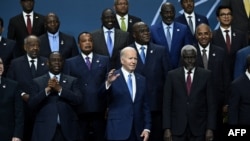The U.S. - Africa Leaders Summit, which concluded last week, produced a United States commitment totaling $70 billion over the next three years.
The funding will, among other goals, tackle food insecurity and the climate crises, which Africa contributes the very least to, but is bearing the brunt for - as seen in parts of the continent like Nigeria where floods in October claimed hundreds of lives, destroyed homes and livelihoods.
Other areas of cooperation include support for democracy and human rights, and how the U.S is planning to help Africa find peace and security in the face of what President Joe Biden termed "democratic backsliding."
Africa’s digital innovation would see an investment of over $350 million with the Biden administration working with Congress to "facilitate over $450 million for Africa" under the newly launched "Digital Transformation with Africa Initiative."
This, the White House said supports the African Union’s digital strategy and the U.S. intentions toward sub-Saharan Africa as its "digital ecosystem offers massive potential to spur economic recovery, promote opportunity, advance social equality and gender equality, and create jobs."
Odeh Friday, Accountability Lab Nigeria's country director, told VOA from Lagos that despite successes, the summit failed to address a pressing issue - illicit financial flows which he said should have featured prominently on the agenda.
He asked "Why would the Biden administration be all out for Africa with one of the major corruption models for Africa illicit financial flow with money being shipped out from Africa to the U.S, and not address this issue?"
"We need to begin to put in systems that can address those kinds of issues. We lose basically about $90 billion between the African and U.S. governments."
The United Nations Economic Commission for Africa (UNECA) estimates that over $84 billion is lost to illicit financial flows from Africa every year. That’s almost equal to the amount the continent receives as remittances annually according to the UN body.
Deputy spokesperson at the U.S State Department Nathan Tek told VOA in an emailed statement that the government is using executive orders, sanctions and visa restrictions to clamp down on corrupt and human rights abusers on the continent and elsewhere.
He cited the designation of Mali's former President of the National Assembly’s Defense Committee, Karim Keita, for misappropriation of public funds, Guinea's Alpha Conde, and a Burundian former official for ''gross human right abuses'' as examples.
''Elevating, integrating and strengthening anti-corruption and fiscal transparency efforts as a fundamental part of inclusive development and private sector-driven growth is a priority of the U.S. Government and Biden/Harris Administration,'' Tek said.
The summit was the second to be held on American soil since it was first launched by former U.S. President Barack Obama in 2014. That’s eight years ago thus prompting analysts to question the long-term goal of the U.S government as it seeks to deepen its relations with the African people.
"The big win for Africa is to feel like this is a long-term sustainability plan that has development focused on the plan," Friday said.
Dave Peterson, senior director of Washington-based National Endowment for Democracy told VOA that the summit largely addressed some of the challenges facing Africa today, adding that real impact will be felt by "everybody" if implemented.
"It’s a matter of follow-up and implementation," he said while noting "disappointments" by some civil society groups who felt they were not engaged.
President Joe Biden on Thursday announced the appointment of U.S Ambassador Johnnie Carson as a Special Representative for the U.S.-Africa Leaders Summit Implementation.
He described Carson as a "man with deep respect for Africa" who has "long experience working with governments across the continent" to ensure that commitments made on paper translates "into progress that people can see in their daily lives."
Carson, the White House said will "ensure that the important dialogues that began during the summit lead to durable action."
"He will also work with a wide range of stakeholders to explore mechanisms for future high-level engagement. We are looking forward to bringing him on board," with the State Department official telling VOA ''we don't have a date to offer as to when Ambassador Carson will begin his role at this time.''
But analyst Peterson believes that "a lot is going to depend on the resources that are at his (Carson’s) disposal."
"The sort of assistance that he would receive and whether he will have access to President Biden, and the senior State Department officials," he said.




